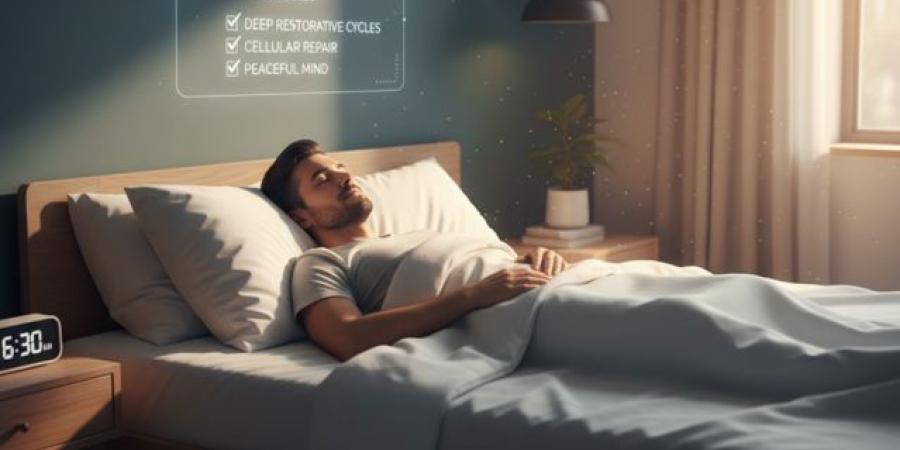نعرض لكم زوارنا أهم وأحدث الأخبار فى المقال الاتي:
5 Science-Backed Tips for a Better Night’s Sleep - المصدر 24, اليوم الأربعاء 12 نوفمبر 2025 11:58 صباحاً
المصدر 24 - If you’ve ever spent the night tossing and turning, you know how one bad night of sleep can ruin your entire day.
You feel groggy, irritable, and unfocused — and no amount of caffeine seems to fix it.
But getting better sleep isn’t just about comfort.
Science shows that quality rest affects everything from immunity and metabolism to mental health and longevity.
Fortunately, small changes in your daily habits can dramatically improve your sleep quality.
Here are five science-backed tips to help you get the restful, restorative sleep your body deserves.
1. Keep a Consistent Sleep Schedule
Your body loves routine.
Going to bed and waking up at the same time every day — even on weekends — trains your circadian rhythm, your internal clock that regulates sleep and wakefulness.
Why it matters:
When your schedule changes frequently, your body can’t predict when to release sleep hormones like melatonin, which leads to insomnia or fatigue.
Science says:
According to the National Sleep Foundation, adults who follow consistent sleep schedules experience better sleep quality, faster sleep onset, and improved morning alertness.
Pro tip:
Aim to go to bed within the same 30-minute window every night.
Get sunlight exposure in the morning to reinforce your natural sleep-wake cycle.
Avoid “catching up on sleep” — it confuses your internal rhythm.
2. Create a Bedroom Environment That Promotes Sleep
Your bedroom should signal one thing to your brain: rest.
Why it matters:
Light, temperature, and noise can all interfere with melatonin production and sleep cycles.
Science says:
Studies in the Journal of Sleep Research show that an optimal sleep environment includes a cool temperature (around 65°F / 18°C), complete darkness, and minimal noise.
How to improve your sleep environment:
Use blackout curtains or a sleep mask to block light.
Keep your room slightly cool and well-ventilated.
Remove electronic devices that emit light or sound.
Pro tip:
Invest in a quality mattress and pillow — poor support can cause physical discomfort that disrupts deep sleep.
3. Limit Screen Time Before Bed
Scrolling through your phone or watching TV before sleep might seem harmless — but it’s one of the biggest modern sleep killers.
Why it matters:
Screens emit blue light, which suppresses melatonin and tricks your brain into thinking it’s daytime.
Science says:
Research published in PNAS found that people who used electronic devices before bed took longer to fall asleep, had less REM sleep, and felt more tired the next morning.
Pro tip:
Turn off all screens at least one hour before bed.
Use “Night Mode” or blue-light filters on your phone if you must use it late.
Replace scrolling with relaxing activities like reading or journaling.
4. Watch What You Eat and Drink Before Bed
Late-night snacks or certain drinks can seriously interfere with your sleep quality.
Why it matters:
Heavy meals make your digestive system work overtime, while caffeine and alcohol disrupt your body’s natural rhythm.
Science says:
The American Journal of Clinical Nutrition found that eating close to bedtime reduces REM sleep, while caffeine intake within 6 hours of bedtime can delay sleep onset.
Pro tip:
Avoid caffeine after 2 p.m.
Limit alcohol — it may help you fall asleep faster, but it reduces deep sleep later in the night.
Choose light snacks if hungry before bed, like yogurt, a banana, or almonds.
5. Manage Stress and Relax Before Sleep
Even if your body is tired, your mind can keep you awake.
Racing thoughts, anxiety, or mental to-do lists can make falling asleep feel impossible.
Why it matters:
Stress increases cortisol levels, which keeps your body in a state of alertness and delays melatonin production.
Science says:
A Frontiers in Psychology study found that relaxation techniques like deep breathing, meditation, and progressive muscle relaxation significantly improved sleep quality and reduced insomnia.
Pro tip:
Establish a calming bedtime routine — try light stretching, soft music, or deep breathing.
Keep a notebook beside your bed to jot down lingering thoughts before sleeping.
Practice gratitude — reflecting on positive moments can lower nighttime anxiety.
Bonus: Move Your Body During the Day
Exercise helps regulate your internal clock, releases stress, and increases deep sleep.
But timing matters — late-night workouts may raise body temperature and adrenaline levels, making it harder to unwind.
Pro tip:
Try to finish intense exercise at least 3 hours before bedtime. Light activities like yoga or walking are fine closer to sleep.
The Science Behind Sleep Quality
Sleep isn’t just “shutting down” — it’s an active process where your brain and body repair, detoxify, and recharge.
During deep sleep, your immune system releases proteins called cytokines that fight infection and stress.
Lack of quality rest disrupts these functions, increasing your risk of obesity, diabetes, and even heart disease.
In short, sleep is the foundation of health. Without it, everything else — diet, focus, energy — starts to crumble.














0 تعليق